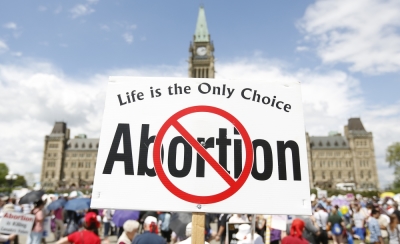The flaws in a study of abortion rates and the Mexico City Policy

One significant pro-life accomplishment thus far during the Trump administration has been the decision to reinstate and expand the Mexico City policy, which prevents U.S. foreign aid from funding organizations that perform or promote abortions. It has been in place during the administration of every GOP president since Ronald Reagan. Under Trump, the policy now includes not only family planning funds but also funding for global-health assistance.
Unsurprisingly, supporters of legal abortion have been vigorous in their opposition to this policy, aggressively promoting studies that claim to show that the Mexico City policy has in fact increased abortion rates overseas. A 2011 study published by the World Health Organization, and more recently a 2019 study by Rutgers University professor Yana van der Muelen Rodgers both have received a significant coverage.
This June, a new study on this topic appeared in the British Medical Journal The Lancet Global Health, authored by a team of researchers at Stanford University, has been receiving a considerable amount of attention. This study is somewhat different than the other two, analyzing more years of data. It is more rigorous analytically, and it appeared in a prestigious academic journal, but even so, it contains many of the same methodological shortcomings as the previous studies.
For one thing, it is important to note that overseas abortion data are often incomplete. Like other studies assessing the effect of the Mexico City policy, this one suffers from missing many data points. The study analyzed abortion data from 26 African countries between the years of 1995 and 2014. The authors report no abortion data for 170 of the 520 state-year pairs, meaning that nearly one-third of the potential data points are missing. Also, the authors obtained abortion data for all 20 years from only six of the 26 countries covered in the study, meaning that more than three-quarters of the countries in the dataset have missing data points.
Additionally, the available data on overseas abortions are often unreliable. A close look at the data used by the authors exhibits some implausibly large variations in the incidence of abortion. For instance, according to data included in the supplementary appendix, the reported number of abortions in Ghana increased 72-fold between 1996 and 1997. In Zambia, the reported number of abortions fell by 61 percent between 2013 and 2014. Similarly, in Swaziland, there was a 76-percent reduction in the number of reported abortions between 2006 and 2007. Some of these variations in the reported number of abortions may be due to incomplete data collection, and they demonstrate serious reliability issues with the new study.
It is also worth noting that while the Mexico City policy is important, there are many other factors that impact both foreign-aid grants and overseas public-health outcomes. The study finds that per-capita family planning and reproductive-health aid slightly increased after the Bush administration reinstated the Mexico City policy in 2001. While many criticize the policy for limiting access to contraception overseas, reported contraceptive-use rates actually increased after it was reinstated by the Bush administration. Even though the authors claim that rescinding the policy would lower the incidence of abortion, reported abortion rates actually went up after the Obama administration rescinded it in 2009.
Like other recent Republican administrations, the Trump administration made a principled decision to stop requiring U.S. taxpayers to subsidize abortion overseas, and administration officials have worked to strengthen this policy. The studies claiming that the Mexico City policy increases abortion rates all have methodological shortcomings, and a considerable amount of academic research demonstrates that defunding organizations that perform abortions is an effective strategy for lowering abortion rates.
Originally posted at nationalreview.com



























